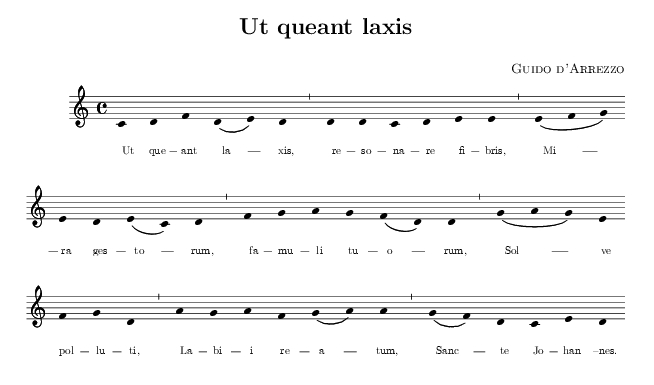Ask a Question(Create a thread) |
|
|||||||
The musical notesPractice your Spanish or English! Try to reply in the same language as the OP. |
 |
|
|
Thread Tools |
|
#1
|
|||
|
|||
|
The musical notes
I would greatly appreciate corrections and suggestions on this text. I chose the topic after reading about it in another thread.
Firstly the musical notes used in Europe were just the first letters of the alphabet: A, B, C, D, E, F, G, H. In the Middle Ages, Guido de Arezzo, being an italian monk who also wrote about music theory, made up a new way of naming the notes. He used the Latin hymn below, and called the notes after the first syllable in each verse (except in the last one). Doing that, the new names were: Ut, re, mi , fa, sol, la, si. Ut queant laxis,Resonare fibris,Mira gestorum,Famuli tuorum,Solve polluti,Labii reatum,Sancte Ioannes. As this hymn was already sung by the monks, each syllable was sung using a different note. It's worth noting that the first note in the first verse was the note C, and the next notes were the ones coming after the one in the previous verse; so it wasn't a random proccess at all. The result is sohwn below: Ut re mi fa sol la si C D E F G A B Long after that, the word 'ut' was substituted by 'do'. As far as I can remember, this was done because of the difficulty found when pronunciating 'ut' while singing. In the aftermath, the new names were used in the countries whose languages were originated from latin, meanwhile other countries kept on using the 'old' names. Nonetheless, I've heard that the syllable system is also used in some English speaking countries to learn how to read music. An example of this could be one of the songs that can be found in the soundtrack of the film 'The sound of music'. By the way, this film was curiously translated into Spanish as 'Sonrisas y lágrimas' (smiles and tears). Similarly, the alphabet system is also well known by jazz musicians all over the world as jazz music sheets use it. In fact, not only do the jazz musicians know it, but also a lot of pop or rock musicians who study on books and websites writen in English. |
|
Get rid of these ads by registering for a free Tomísimo account.
|
|
#3
|
|||
|
|||
|
I was expecting comments on the writing rather than on the contents, but anyway it's interesting what you said. I've got some questions:
- When you said that 'ut' was G in the very begining, do you mean that the scores as this one has been transported?  http://upload.wikimedia.org/wikipedi.../Ut_queant.jpg (I know wikipedia is not a reliable source of information, but this score can be found in many books on History of Music.) I think I'm remembering one of the teachers at the Conservatory talking about what you said, but as I get older, I'm getting more absent-minded  . I'm curently teaching music at a secondary school, and always keen on learning new things, so thanks for your information. . I'm curently teaching music at a secondary school, and always keen on learning new things, so thanks for your information.I was going to ask you what 'shape-note singing' was, but I just have a 'Google look' and found this website: http://fasola.org/ Just from reading the first page, it sounds interesting. I'll be back to it. Disclaimer? Quote:
Last edited by Rusty; August 29, 2011 at 06:31 AM. Reason: merged back-to-back posts |
|
#7
|
||||
|
||||
|
Quote:

|
|
#8
|
||||
|
||||
|
Quote:
Quote:
Quote:
The other two are: (1) the web site of Dr. Warren Steel at University of Mississippi (Oxford), and (2) the English wikipedia articles on Sacred Harp and on shape notes. The Sacred-Harp resources listings attached to fasola.org and to Dr. Steel's page list most of the non-electronic sources of information. Quote:
Edit: Sometimes "disclaimer" refers to an acknowledgement of the existence a relationship that some people may consider to be a conflict of interest or a possible source of bias. Last edited by wrholt; August 29, 2011 at 10:40 AM. Reason: Added about "disclaimer" |
|
#9
|
|||
|
|||
|
Thanks a lot to everybody. Just a doubt:
Quote:
who study books and websites From my 'spanish' point of view, it looks as if they were studying both the whole books and the whole websites. Could I write, instead of 'on', 'using', 'by using', 'by means of', 'by means of using', 'through'? Prepositions are one of the things that drives me nuts! (I think and hope this is not really a swear word) |
|
#10
|
||||
|
||||
|
... who study on
 ... who study using  ... who study by using   ... who study by means of   ... who study by means of using  ... who study through  It's perfectly fine to say that something drives you nuts. This is the same as volver loco. |
 |
«
Previous Thread
|
Next Thread
»
| Link to this thread | |
|
|
|||||||
 Similar Threads
Similar Threads
|
||||
| Thread | Thread Starter | Forum | Replies | Last Post |
| To take notes/to make notes | ROBINDESBOIS | Vocabulary | 4 | January 30, 2011 02:57 AM |
| Practicing - simple notes | JosephThomas | Grammar | 9 | December 14, 2010 10:50 AM |
All times are GMT -6. The time now is 02:29 PM.







